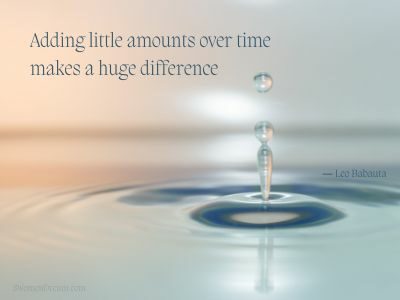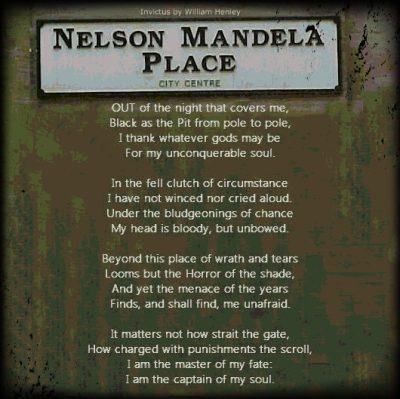Last updated on July 18th, 2022 at 04:01 pm
 NOTE: Today’s story is a guest post from the blog www.zenhabits.net by Zeo Babauta.
NOTE: Today’s story is a guest post from the blog www.zenhabits.net by Zeo Babauta.
When we learn a martial art, or ballet, or gymnastics, or soccer, we consciously practice movements in a deliberate way, repeatedly. By conscious, repeated practice, we become good at those movements.
Our entire lives are like this, but we’re often less conscious of the practice.
Each day, we repeat movements, thought patterns, and ways of interacting with others and in this repeated practice, we are becoming (or have already become) good at these things. If you constantly check social media like Facebook or Twitter, that is practice, and you are forming that habit, though it’s usually not with too much awareness.
When you smoke, eat junk food, speak rudely to others, or put yourself down internally, this is something you are practicing to be good at. You may already be good at these things.
What if, instead, we practiced consciously, deliberately, and became good at the things we really want to be good at? What if you first, above all skills, learned to be more aware of what you are practicing? What if constant conscious action is the skill you became good at? If you could learn to take conscious action, you could learn to practice other things you want to be good at, rather than the ones you don’t.
What Are You Practicing?
Ask yourself these 12 things throughout the day:
1. Do I want to practice rushing through my morning, or can I wake a little earlier and simplify my morning routine so that I practice a slow, enjoyable morning ritual?
2. Do I want to practice checking my inboxes when I first get to my computer, or can I do something better?
3. Do I want to practice leaving dirty dishes out, or can I practice washing my bowl when I’m done with it?
4. Do I want to practice leaving clothes strewn about, or papers lying on the counter, or can I take a few seconds to put them where they belong?
5. Do I want to speak angrily to my kids or spouse, or can I speak to them with kindness and compassion?
6. Do I want to practice complaining and self-pity, or can I practice gratitude?
7. Do I want to practice rushing and being busy, or can I practice simplifying and going slowly?
8. Do I want to practice eating fried foods, sugary foods, salty junk food snacks, or fast foods … or can I practice eating whole foods, vegetables, and fruits, nuts and beans, and seeds?
9. Do I want to practice surfing time-wasting sites, or can I practice clearing away distractions and creating?
10. Do I want to practice watching mindless entertainment, or can I practice moving my body and exerting myself in activity?
11. Do I want to practice smoking, or can I learn a healthier way to deal with stress?
12. Do I want to practice shopping, or can I practice giving?
These are only examples–your life will show you what you’ve been practicing, and you can decide what you might rather practice instead. Or you might be completely happy with what you’ve been practicing.
Some ideas for creative practice from Ali Edwards.
How to have a Creative Practice
The first step is always awareness. When you are conscious of what you are doing, you can decide whether this is an action or thought pattern you want to practice, or if there’s an alternative you’d rather be good at.
As you go through your day, practice this awareness. It’s the first skill, and it’s the most important one. Be aware, without feeling guilty or angry at yourself, of what you’re doing and thinking. You will forget to do this, but remind yourself. You might wear a rubber band around your wrist, carry a talisman, or make tally marks on a slip of paper each time you remember.
As you get good at conscious action, start to practice those actions and thought patterns you want to be good at. Start to notice the ones you’d really rather not be good at, and see if you can deliberately practice other actions and thought patterns.
As you consciously, and deliberately repeat these things, you’ll get better at them. It takes a lot of repetition to get good at a skill, but you’ve got time.
Important Conclusions on Changing Habits
You won’t be able to change all your habits at once, and I’m not implying that you should try. The habit you’re really changing is consciousness and practice. Other habits will be difficult to change, especially if you’re trying to change all of them, but it’s OK if you mess up. Give yourself permission to make mistakes without guilt, and instead, just deliberately practice again, and again.
If something is too hard, and you can’t get it right no matter how many times you practice, you can try it in smaller steps. If you can’t quit smoking, try not smoking once, and instead relieve stress through walking or doing some pushups or meditation or self-massage. If you can’t quit junk food, just replace one snack with fruit, or add a tasty veggie to your dinner.
I’d like to emphasize that this isn’t about perfection. There is no perfect way of life, and you don’t need to strive to be perfect every moment of the day. I believe you’re already perfect. This is just about conscious action, which is a useful skill to have.
Remember that we become good at what we repeatedly do, and what we do repeatedly can be done consciously. It’s when we’re conscious that we are truly alive.

Enjoy this special 8WomenDream Guest Contributor story submitted by new and experienced big dreamers throughout the world, edited and published to capture a dream perspective from different points of view. Do you have a personal dream story to share with 8WomenDream readers? Click here to learn how to submit dream big articles for consideration.
Note: Articles by Guest Post Contributors may contain affiliate links and may be compensated if you make a purchase after clicking on an affiliate link.




